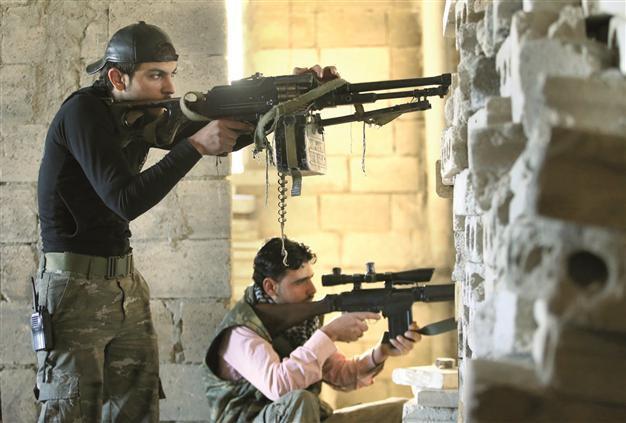Chief of Free Syrian Army ask weapons from Europe
BRUSSELS / LONDON

Rebels take their positions against the regime soldiers in Idlib. AP photo
The chief of staff of the rebel Free Syrian Army (FSA) arrived in Brussels yesterday to plead with the international community to supply it with arms and ammunition so it can resist attacks by Syrian President Bashar al-Assad’s government.
Gen. Salim Idris, head of the rebel’s Supreme Military Council, said anti-tank and anti-aircraft missiles were urgently needed to protect the civilian population. Idris complained that Russia and Iran were helping al-Assad, adding that the West merely condemned the government without supplying the rebels with weapons.
“When we don’t have enough weapons, when we don’t have enough ammunition, the regime still considers itself powerful, and it continues killing,” he told the Alliance of Liberals and Democrats for Europe, a political grouping in the European Parliament.
“If we have the arms and munitions we need, we can get rid of the regime within a month,” Idris said. “We’re making real progress. A great deal of the east of the country has been liberated.”

The leader of the Free Syrian Army,
Gen Salim Idris, asks for arms to sent to
rebels fighting Damascus during an
address to the European Parliament.
The plea came as Britain said the world’s efforts to end the bloodshed in Syria had been an “abject failure,” and urged the European Union to be prepared to “move further” if no political solution to the crisis was found.
The EU has a blanket arms embargo in place against Syria. Britain has pressed for the embargo to be loosened to allow more aid to the rebels. But other EU countries contend that more arms is the last thing Syria needs.
In his strongest comments on the Syria conflict yet, Foreign Secretary William Hague said Britain would increase aid to Syria’s opposition and supply it with armored vehicles and training, which would include advice on how to secure areas seized from al-Assad’s forces.
Hague said the chances of achieving an immediate political solution to the nearly two-year-old crisis were slim and that diplomacy was taking too long. However, he played down the prospect of direct Western military intervention.
“In our view, if a political solution to the crisis in Syria is not found and the conflict continues, we and the rest of the European Union will have to be ready to move further, and we should not rule out any option for saving lives,” Hague told Parliament.
The secretary, however, added: “No Western government is advocating military intervention of Western nations into the conflict in Syria. The discussion is entirely focused on the degree of assistance that can and should be delivered to the opposition.”
Hague said he would soon discuss Syria with Russia’s foreign minister and deputy foreign minister, as well as with the United Nations’ Syria mediator, Lakhdar Brahimi.
U.S. Secretary of State John Kerry also said yesterday that “a lot of countries” are training Syrian rebels as part of stepped-up efforts to topple al-Assad. “It’s one part of it. But other nations are doing other things. There are a lot of nations working at this. And so I think President al-Assad needs to read the tea leaves correctly,” Kerry told Fox News during a visit to Qatar.
Kerry did not say which countries were involved in the effort or whether the United States was training rebels. “There are a lot of countries doing training,” he said.
“What is important is that President al-Assad needs to understand the re-focus of commitment in order to get him to change his current calculation, and in order to hopefully get his allies to advise him: ‘You need to go to the table and negotiate a peaceful resolution.’”
The U.S. says it has so far refused to arm the rebels, but Kerry expressed on March 5 confidence that weapons supplied by Gulf countries were reaching the “right people.”

